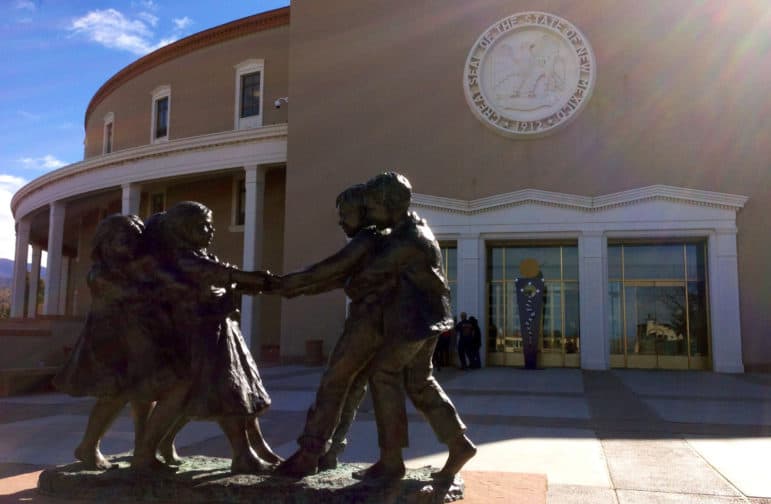
Heath Haussamen / NMPolitics.net
The compromise appeared likely to end a five-year political battle by making New Mexico compliant with the federal REAL ID Act and continuing to allow immigrants without legal status a way to drive legally.
Both Gov. Susana Martinez and immigrant advocates claimed victory after a Senate committee on Friday approved a compromise bill that would allow immigrants without legal status a way to drive legally — and would exempt many of them from a requirement to be fingerprinted.
The Senate Finance Committee approved the bill on a 10-0 vote. That appeared likely to end a five-year political battle by making New Mexico compliant with the federal REAL ID Act and continuing to allow immigrants without legal status a way to drive legally.
Martinez lost most of what she wanted and campaigned on for five years — a repeal of driving privileges for immigrants without legal status. The compromise bill, which she said she will sign into law, allows such immigrants to get state-issued driving authorization cards. The bill also allows U.S. citizens and immigrants with lawful status to decide if they want a license that complies with the federal Real ID Act or the same type of authorization card that will go to immigrants who can show proof of identity and residency in New Mexico.
“I support this bill in its current form, and call on lawmakers in both chambers to do what the people have asked us,” Martinez said in an email. “Let’s pass this bill as is.”
Under the bill, the state Motor Vehicle Division would only fingerprint immigrants without legal status who don’t currently have a state driver’s license and are newly applying for the driving authorization card, which couldn’t be used for federal identification purposes.
The fingerprints would be used to conduct criminal background checks using the FBI’s database. If any warrants or another alias are found for an applicant, the state would ask the immigrant to take care of those issues before he or she can get a driving authorization card. The information collected from the FBI can’t be shared with immigration officials, as Republicans first wanted, per federal policy.
State Rep. Paul Pacheco, R-Albuquerque, who originally introduced the legislation and then saw Senate Democrats in another committee strip it of the fingerprinting requirement altogether, said he supports the bill the way the Senate Finance Committee amended it on Friday. The Real ID Act doesn’t require states to collect fingerprints from anyone, but Pacheco said such a provision was necessary to prevent fraud.
“That does take a huge bump out of the road,” Pacheco told the panel. “I appreciate it.”
Marcela Diaz, executive director of Somos Un Pueblo Unido, a Santa Fe-based immigrant advocacy group, said immigrants are happy because Martinez lost a years-long “war.”
Immigrants were against the bill’s original fingerprint provision because it would have required the state to contact immigration officials to notify them about any outstanding warrants the applicant may have had. This, advocates said, would have led to the deportation of a lot of immigrants.
“If you compare the initial bill, which included repeal and cancellations, to the one that got out of Senate Finance tonight, it’s night and day,” said Elsa Lopez of Somos Un Pueblo Unido.
It’s unclear how many immigrants without legal status the fingerprint provision would affect in the future. But according to the state Taxation and Revenue Department statistics, fewer new immigrants are applying for licenses. Last year, 4,026 immigrants obtained a driver’s license for the first time. That is a 73 percent drop from 2010, when the state provided the most licenses to immigrants. It’s unclear how many first-time applicants are immigrants without legal status because the current law doesn’t ask for immigration status. It only distinguishes foreign nationals from U.S. citizens.
The federal law says New Mexico licenses have to meet certain requirements in order to use them to enter a secured federal facility. In 2018, if the license isn’t compliant, it won’t be accepted to enter a commercial plane to fly domestically.
Contact Uriel J. Garcia at 986-3062 or ugarcia@sfnewmexican.com. Follow him on Twitter @ujohnnyg.